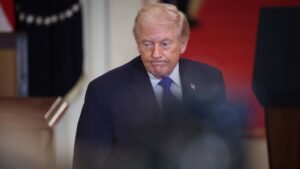US Treasury Secretary Scott Bessent said the US is satisfied with its current tariff strategy with China, highlighting the Trump administration’s focus on stability as the November trade truce approaches. Bessent told Fox News that the existing tariff setup is “working pretty well” and described China as the largest source of US tariff revenue.
In a later interview with CNBC, he noted that tariff income under President Trump is expected to surpass previous estimates of $300 billion. The revenue will be used to reduce federal debt rather than provide rebate checks to Americans. “I’ve been saying that tariff revenue could be $300 billion this year. I’m going to have to revise that up substantially,” Bessent said.
The news comes as S&P Global Ratings confirmed the US’s AA+ long-term credit rating, maintaining a stable outlook. The agency noted that tariff revenues will help offset the fiscal impact of President Trump’s recent tax and spending initiatives. Despite concerns about sweeping tariffs affecting markets and trade relations, the rating agency emphasized that the US economy remains strong.
Meanwhile, Brazil formally responded to a US trade investigation, rejecting the claims and challenging the probe’s validity. The investigation, launched in July under Section 301 of the 1974 Trade Act, examines whether Brazil’s digital trade and tariff practices unfairly disadvantage US businesses, according to US Trade Representative Jamieson Greer. Brazil’s Finance Minister Fernando Haddad said talks have reached a deadlock. Resolving the dispute, he added, will depend on the US’s willingness to engage in negotiations.
Earlier this month, President Trump announced “reciprocal” tariffs on multiple US trade partners. Analysts are now focusing on upcoming discussions with Canada, Mexico, and China to see how trade relations will develop. Economists suggest that the growing tariff revenue could provide a short-term boost to the US federal budget. However, ongoing tariffs continue to create uncertainty for global trade and could affect long-term business investment. Investors are watching closely how these policies unfold, especially with major trade negotiations scheduled in the near future. The combination of high tariff income and strategic negotiations could shape US-China relations for years to come.
Bessent’s comments signal that the Trump administration intends to maintain its current stance while seeking stability in trade, rather than making major adjustments before the upcoming deadlines. The US administration’s approach to tariffs will continue to influence both domestic revenue streams and international trade dynamics. Observers expect that any changes in trade policy could impact markets, government finances, and global relations. Experts also note that while tariffs can generate revenue, they may also increase costs for American businesses and consumers, highlighting the delicate balance the administration must maintain.







